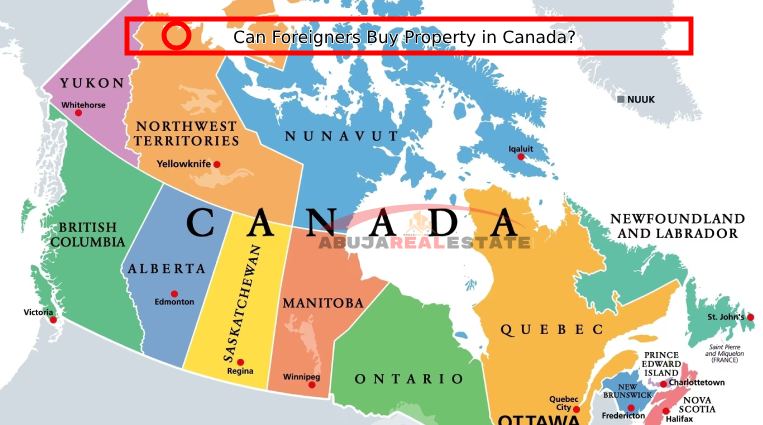Can Foreigners Buy Property in Canada?

Canada, with its strong economy, stable political system, and stunning natural landscapes, has long been an attractive destination for foreign investors and immigrants. One of the most common questions among potential investors, expatriates, and global nomads is: Can foreigners buy property in Canada? This article provides a detailed, up-to-date insight into foreign property ownership in Canada, costs of homeownership, and the earnings potential in Canadian real estate. Whether you’re an investor from Nigeria or a non-resident looking to secure property in North America, this guide is for you.
Can Foreigners Buy Property in Canada?

Yes, foreigners can buy property in Canada, but with certain restrictions and regional variations that came into effect recently. For years, Canada welcomed foreign real estate investments, especially in cities like Toronto, Vancouver, and Montreal. However, due to increasing concerns about housing affordability for locals, the government implemented new policies to regulate the influx of foreign buyers.
Understanding the Foreign Buyer Ban
As of January 1, 2023, the Prohibition on the Purchase of Residential Property by Non-Canadians Act came into effect. This legislation prevents non-Canadian individuals and foreign commercial entities from buying residential property in designated urban areas for a period of two years, ending on January 1, 2025.
Who Is Affected?
The ban applies to:
- Non-Canadian individuals who are not citizens or permanent residents
- Corporations based outside Canada
- Foreign-controlled entities or trusts
Exemptions to the Ban
Not all foreign investors are restricted. Exemptions include:
- International students (meeting specific criteria)
- Refugees and individuals with protected status
- Diplomats and consular staff
- Temporary residents who meet specific work or study criteria
- Properties in rural areas or cities with a population of fewer than 10,000 people
For Nigerians looking to invest in Canadian property, it’s crucial to consult a real estate lawyer or agent familiar with these regulations to ensure compliance and explore alternative investment zones not affected by the ban.
How Much Would a House Cost in Canada?
The cost of a house in Canada varies widely depending on the location, type of property, and market trends. In recent years, prices have surged in many regions, driven by high demand, low supply, and historically low-interest rates. However, with new regulations and changing economic conditions, the market is adjusting.
Read Also: Buy Land in Scotland: A Complete Guide for Locals and Foreigners
Average Home Prices by Region (2025)
As of early 2025, here are estimated average residential property prices in major regions:
| Location | Average Price (CAD) | Average Price (USD) |
| Vancouver, BC | $1.18 million | ~$860,000 |
| Toronto, ON | $1.1 million | ~$800,000 |
| Calgary, AB | $570,000 | ~$415,000 |
| Ottawa, ON | $670,000 | ~$490,000 |
| Halifax, NS | $490,000 | ~$360,000 |
| Winnipeg, MB | $380,000 | ~$275,000 |
Exchange rate: Approx. 1 CAD = 0.73 USD as of June 2025.
Factors Affecting Real Estate Prices
Several factors influence housing costs in Canada:
- Location: Urban centers like Vancouver and Toronto are more expensive due to demand.
- Property type: Detached homes cost significantly more than condominiums or townhouses.
- Market dynamics: Interest rates, housing policies, and construction rates all impact prices.
- Proximity to amenities: Access to schools, transport, healthcare, and employment hubs boosts value.
Additional Costs for Foreign Buyers
In some provinces, foreign buyers (even those temporarily exempted from the federal ban) may need to pay:
- Non-Resident Speculation Tax (NRST): Up to 25% in Ontario and 20% in British Columbia
- Land Transfer Tax
- Legal Fees and Registration Charges
- Annual Property Taxes
Foreign investors from Nigeria or elsewhere should budget an extra 15-25% of the property price for these added costs, particularly in Ontario and British Columbia.
How Much Does Real Estate Pay in Canada?
The Canadian real estate sector offers multiple income opportunities for both residents and foreigners involved in various capacities—whether as agents, brokers, investors, or property managers.
Real Estate Agent Income
Licensed real estate agents in Canada typically earn income through commissions based on property sales. The standard commission rate is around 4-6% of the home’s sale price, usually split between the buyer’s and seller’s agents.
Average Annual Earnings:
| City/Province | Estimated Annual Income (CAD) |
| Toronto, ON | $100,000 – $150,000 |
| Vancouver, BC | $90,000 – $130,000 |
| Alberta & Saskatchewan | $75,000 – $110,000 |
| Quebec | $60,000 – $95,000 |
Income depends on market conditions, experience, and the agent’s client network.
Real Estate Investment Returns
Foreign and local investors generate revenue through rental income and property appreciation. For instance:
- Toronto condos yield an average 3.5%–5% rental return
- Detached homes in Calgary may yield 4.5%–6%, particularly in family-centric neighborhoods
- Commercial property yields vary, but often exceed 6% in emerging cities like Winnipeg and Halifax
With smart strategy and local guidance, foreign investors—once qualified—can potentially earn substantial passive income through real estate.
Property Management & REITs
For those unable or unwilling to buy physical property due to restrictions, Canadian Real Estate Investment Trusts (REITs) offer a viable alternative. These allow international investors to:
- Diversify property holdings
- Earn dividend income
- Avoid direct property management
Some top-performing Canadian REITs are publicly traded and available through international stockbrokers.
Why Foreigners Choose Canadian Real Estate
Foreigners continue to be attracted to Canadian property markets for the following reasons:
1. Stable Economy
Canada boasts a resilient banking system, low corruption, and sound fiscal policies, making it a safe investment zone.
2. Quality of Life
World-class healthcare, education, and public services make Canadian cities desirable for relocation or retirement.
3. Capital Appreciation
Despite short-term regulatory slowdowns, long-term prospects for capital growth in Canadian property remain strong.
4. Diversification
For Nigerian investors especially, Canadian real estate offers diversification from local currency volatility and economic uncertainty.
What to Consider Before Buying Property in Canada
If you’re planning to invest in Canadian real estate as a foreigner, keep the following in mind:
- Regulations and Restrictions: Stay updated on federal and provincial laws.
- Financing Challenges: Most Canadian banks offer limited mortgage options to non-residents.
- Currency Exchange: Exchange rates can significantly impact overall investment value.
- Property Management: Non-resident landlords must appoint agents for tax purposes and local management.
- Legal Assistance: Work with licensed Canadian lawyers and real estate agents to avoid legal pitfalls.
Frequently Asked Questions (FAQ)
Q: Can Nigerians buy property in Canada?
A: Yes, Nigerians can purchase property in Canada. However, federal and provincial restrictions may limit urban residential purchases. Exemptions exist for specific categories like students, workers, and refugees.
Q: What is the minimum down payment required for foreigners?
A: Typically, non-residents are required to provide a 35% down payment, higher than Canadian residents.
Q: Can foreigners apply for a mortgage in Canada?
A: Some banks offer non-resident mortgage programs, but terms are stricter, and interest rates may be higher.
Q: Can I make money in Canadian real estate without owning property?
A: Yes. Foreigners can invest in REITs or partner in property syndicates that don’t require direct ownership.
Final Thoughts
So, can foreigners buy property in Canada? The answer is yes—with conditions. The current foreign buyer restrictions are temporary and selective, aiming to stabilize urban housing markets without completely shutting the door to international investment. For Nigerians and other international buyers, rural areas, commercial properties, and exempted categories still offer viable pathways.
Whether you’re seeking a second home, a secure investment, or income-generating rental property, Canada remains one of the world’s most reliable real estate destinations. Just be sure to stay informed, work with local professionals, and strategically plan your entry into the market.


